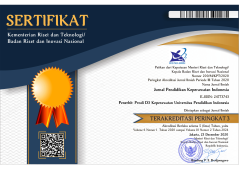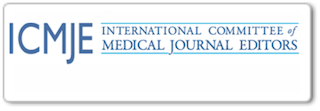Pengaruh Faktor Demografi Terhadap Quality of Nursing Work Life (QNWL) Perawat di Puskesmas Kota Bandung pada Era BPJS
Abstract
ABSTRAK
Sistem jaminan kesehatan nasional di Indonesia baru beroperasi sejak 2014 melalui Badan Penyelenggara Jaminan Sosial (BPJS) kesehatan. Dalam pelaksanaannya, pemberian pelayanan kesehatan pada pasien BPJS menggunakan sistem rujukan berjenjang, dimulai dari Fasilitas Kesehatan (FasKes) tingkat pertama, salah satunya yaitu Puskesmas. Hasil studi pendahuluan menunjukkan bahwa program BPJS kesehatan ini, teridentifikasi dapat memengaruhi pemberi pelayanan kesehatan, termasuk salah satunya dapat memengaruhi Kualitas Kehidupan Kerja Perawat/Quality of Nursing Work Life (QNWL) perawat di Puskesmas Kota Bandung. Padahal QNWL tersebut, pada akhirnya sangat memengaruhi komitmen dan kinerja perawat (Gray & Smelzer, 1990). Penelitian ini bertujuan untuk mengetahui gambaran QNWL dan mengetahui gambaran faktor demografi beserta pengaruhnya terhadap QNWL. Metode penelitian yang digunakan dalam penelitian ini adalah deskriptif kuantitatif dengan pendekatan cross-sectional survey. Penelitian ini dilakukan pada tahun 2017 di 15 Puskesmas Kota Bandung. Data dikumpulkan dengan kuesioner, dan dianalisis menggunakan uji beda 2 mean independen (uji t) dan uji Anova (α=5%). Hasil penelitian ini menunjukkan bahwa: 1) perawat di Puskesmas Kota Bandung memiliki nilai QNWL secara keseluruhan dan dimensi-dimensi QNWL yang berada dalam kategori baik. Namun demikian terdapat 3 komponen yang masih bermasalah, yaitu: masih banyaknya tugas non keperawatan, alat dan bahan untuk perawatan pasien yang kurang memadai, tempat perawat/tempat istirahat/loker yang kurang memadai; 2) tidak terdapat pengaruh yang signifikan faktor-faktor demografi (umur (p=0.096), jenis kelamin (p=0.776), status pernikahan (p=0.953), tingkat pendidikan (p=0.183), status kepegawaian (p=0.217), lama bekerja sebagai perawat (p=0.162)) terhadap Quality of Nursing Work Life (QNWL) perawat di Puskesmas Kota Bandung. Implikasi penelitian ini adalah perlu adanya upaya perbaikan komponen-komponen dan faktor-faktor QNWL yang masih bermasalah. Selain itu, perlu adanya upaya peningkatan status kepegawaian perawat kontrak BLUD menjadi PNS atau minimal setara dengan PNS
ABSTRACT
National health insurance system in Indonesia has been operated since 2014 by the Social Insurance Administration Organization (BPJS). Practically, the provision of health services used tiered referral system, from the first-level health facilities (FasKes), such as Health Center. The result of preliminary studies showed that BPJS program may affect health care providers, including one that can affect the Quality of Nursing Work Life (QNWL) nurses at the health center of Bandung. In the end, QNWL affects the commitment and performance of nurses (Gray &Smelzer, 1990). This research aimed to describe QNWL and to find out demographic factors and its influence on QNWL. The method used in this research is quantitative descriptive cross-sectional survey. This research was conducted in 2017 in 15 health centers in Bandung. The data were collected through questionnaire and analyzed using independent sample t Test and Anova. The results of this study showed (1) Nurses at the health center of Bandung were in a good category on both overall scores of QNWL and dimensions. However, there are three components which are still problematic, namely: a huge number of non-nursing tasks, inadequate tools and materials for patients’ care, inadequate nurses’ restrooms/locker rooms; (2) There is no significant effect of demographic factors, age (p=0.096), sex (p=0.776), marital status (p=0162), level of education (p=0.183), employment status (p=0.217), length of nursing experience (p=0.162) to the Quality of Nursing Work Life (QNWL) nurses in 15 health centers in Bandung. The implications of this research are the need to improve problematic components and factors of QNWL. Moreover, improving the employment status of contract nurses BLUD to civil servants or at least equal to PNS is also neede
d
Keywords
Full Text:
PDFReferences
BPJS. (2014). Integrasi Jamkesda dalam Optimalisasi Program JKN. Info BPJS Kesehatan Edisi III Bulan Juli 2014.
Brooks, B. A., Anderson, M. A. (2005). Defining Quality of Nursing Work Life. Nursing Economics, 23(6), 279,319-326.
Chen, H., Chu, C., Wang, Y., Lin, L. (2008). Turnover factors revisited: A longitudinal study of Taiwan-based staff nurses. International Journal of Nursing Studies, 45 (2): 277-285.
Finn C, P. (2001). Autonomy : An important component for nurses’ job satisfaction. International Journal Nurs Study, 38 (3), 349-357
Gray and Smeltzer. (1990). An Analisis of Quality of Work Life (QWL) and career related variable. American Journal of Applied Sciences, 3 (12), 2151-2159.
Hegney, D., Eley, R., Plank, A., Buikstra, E., Parker, V. (2006). Workforce issues in nursing in Queensland: 2001 and 2004. Journal Clinical Nursing, 15 (12): 1521-1530.
Kementerian Kesehatan RI. (2013). Peraturan Menteri Kesehatan RI Nomor 71 Tahun 2013 Tentang Pelayanan Kesehatan pada Jaminan Kesehatan Nasional. Jakarta: Kemenkes RI.
Nurhayani, Hasniah dkk.( 2013).Hubungan motivasi kerja dengan kinerja perawat di Unit Rawat Inap RSUD Salewangan Maros.Bagian Administrasi dan Kebijakan Kesehatan, FKM Unhas : Makassar
Omega, C. (2015). Pengaruh faktor-faktor quality of work life terhadap kepuasan karyawan PT. Pertamina Sanggatta field. eJournal Ilmu Administrasi Bisnis, 3 (2), 443-457.
Rastegari, M., Khani, A., galriz, P., & Eslamian, J. (2010). Evaluation of quality of working Life and its association with job performance of the nurse. Iranian journal of nursing and midwifery research, 15(4), 224.
DOI: https://doi.org/10.17509/jpki.v4i1.12338
Refbacks
- There are currently no refbacks.
Jurnal Pendidikan Keperawatan Indonesia(JPKI) published by Indonesia University of Education. JPKI is licensed under a Creative Commons Attribution-ShareAlike 4.0 International License.
Office :
Nursing Department. FPOK UPI.
229, Dr. Setiabudhi Street. Bandung 40154
West Java , Indonesia
E-mail : jpki@upi.edu

_.png)
_.png)
_.png)











